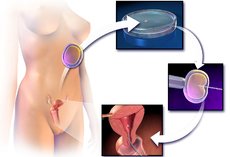
Discuss with Specialist
Gynaecare Fertility Center is located at Kolkata, India. We have team of experts to take care for all your infertility related problems. Our team of expert includes, Dr. Abhishek Daga Gynaecologist and infertility specialist, one of the leading gynecologist and infertility specialists in Kolkata, He obtained his MBBS from Burdwan Medical College (West Bengal). He is also an MS and MRCOG1 from London. Our patients (name cannot be shared as per our privacy policy) says that Dr. Daga is having magical clinical hand and achieved high success rate in IVF or Test Tube Babies.

Many couples around the globe like UK, Australia, USA, Bangladesh and Middle East (Arabian Countries) come to Kolkata (India) in search of the joy of parenthood. Now a day, almost 100 couples are flying to city for their fertility related problems due to low cost and high success rate. Considering the facts, Kolkata is turning into hub for In Vitro Fertilization (IVF).
At Gynaecare Fertility Center, an another leading IVF clinic in Kolkata, you will find most advance equipments (German manufactured IVF Specialist Equipment) with most modern and latest technology along with the highly qualified team to take care for your dream to become parent. This is really heart touching to see couples with tears in their eyes and smile on their faces when they hear first voice of their own new born baby. And at our IVF clinic we mean the same that someone will hold your hand and call you “Papa” & “Mummy” and “Dada” & “Dadi” to your parents.

IVF treatment involves egg/s (ova) fertilisation outside the woman’s body. This treatment is done with your egg and spear or with donated one or using both. A woman’s eggs are surgically removed and fertilised using sperm sample that has been given in the laboratory. Once the egg is fertilized ova (embryo), is surgically implanted into the woman's womb (uterus). In general, one cycle of IVF takes between four and seven weeks.
IVF techniques vary according to your individual circumstances and clinical approch. Before your treatment starts, you and, if applicable, your partner may also need to have blood tests to screen for HIV, hepatitis B, hepatitis C and human T cell lymphotropic virus (HTLV) I and II.
IVF can be done for the following infertility problems diagnosed with your partner:
IVF is one of the best solutions for your fertility related problems if any of the side (Male or Female) is diagnosed with as mentioned above.
There are various ways of In Vitro Fertilization - Natural and mild IVF. Several methods are termed as natural cycle:
Mild IVF is aimed at producing 2-7 eggs and creating healthy embryos whereas in a short duration during a woman’s natural cycle, a small dose of ovarian stimulating drugs are used. IVF procedure (technique / treatment) differ slightly from clinic to clinic as this is very much influenced by various factors and calculations but in general procedure for treatment is as follows:
During the parallel process of partner’s eggs collection, you need to provide fresh sample of sperm. If you are using donated sperm then now this is taken out from frozen storage. The sperm are washed and spun at a high speed using the advance machinery, so the healthiest and most active sperm can be selected. Healthiest sperm will be used in fertilising the eggs collected from your partner
IVF success rate depend on a number of factors like the reason for infertility, how procedure done, and your age. Out of all the most important factor of success rate depends on techniques and expertise behind the procedures which result in a favorable outcome.
At Gynaecare (IVF Clinic), we do various calculations during the procedure which result in numbers of confirmed pregnancies. Due to advancement in reproductive technology, the IVF success rates are substantially better today than they were just a few years ago. Trust us; our IVF specialist’s hands we have achieved pregnancy for 8.5 out of 10 cases. Though we cannot share you with the success couple names or contact details due to our privacy policy but when you will visit us, you may get an opportunity to interact with other couples who are currently undergoing for treatment. They may share you with more of their live & practical experience on how they are doing.

Personal care for Pregnancy, Infertility and IVF Treatment at
Gynae Care Fertility Centre
45, Deshapran Sasmal Road, Kolkata 700033
Landmark: Rabindra Sarobar Metro Gate no 6, Opp. Bhawani Cinema Hall
Make an appointment with specialist for Infertility Problem & IVF
Phone : +91-9433367751 (8:00 am to 8:00 pm)
E-mail : gynaecareclinic@yahoo.co.in